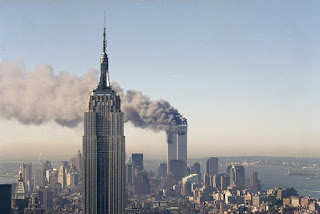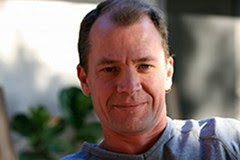Where were you on 9/11?
So, where were you on 9/11? So powerful was that day's impact that
since then 9/11 has pointed uniquely to September 11th 2001. A day when evil men flew hijacked airplanes into the Twin Towers of the New York Trade Centre, as well as
into the Pentagon. Everyone has a story to tell of that day, and
now, exactly fifteen years later, I’ll tell you mine.
On the 11th of September, 2001 I was flying to
Salt Lake City in the United States of America. I was in the air, in US
airspace, when American Airlines Flight 11 hit the North Tower. I had landed
that morning at Newark Airport, and I made my way across the concourse to make
my connecting flight to Salt Lake. At about that time, there at Newark Airport,
United Airlines Flight 93 was taken by the terrorists. But for the whims of
luck and fate it was not my plane they took.
I landed at Salt Lake City and made my way to the hotel,
flipped on CNN to catch up on the news. And so the story unfolded, live on TV. At
first all was confusion. Smoke pouring from the sides of the burning buildings.
Rumours, chaos, fire crews, stunned news anchors. Then the Pentagon, the
collapse of the Towers. I went out onto the city streets. If you’ve ever been
to Salt Lake City you’ll know how it got its name, you can almost smell the
salt. At 1,288 metres above sea level it is lofty, the air feels thin and
ethereal. So much more that day, the sun glittered off the distant crystalline
mountains. People walked the streets shell shocked, staring. Groups gathered in
cafes with nothing to say to each other.
On the following day, over and over again the networks
played film after film of the planes crashing into the Twin Towers. Reliving
the trauma, transfixed by those impossible, dreadful images. I was in Salt Lake
to attend an engineering conference. At the conference centre there were
multiple TV monitors in the building. Small crowds gathered around these
monitors watching the news, watching the replays, and listening to the world’s
shocked responses. And now we come to the heart of my story and the most moving
part. I was watching one of those monitors with a group of American colleagues
when a special news report came through from Great Britain. At the changing of
the guard at Buckingham Palace, the Coldstream Guards’ band played ‘The Star
Spangled Banner’, apparently at the orders of Her Majesty, the Queen. Beside me
my colleagues had tears in their eyes, people in the crowd in London openly
wept. I felt tears in my eyes. It was a wonderful moment of solidarity with the
American people. With me, that gesture still resonates today. It was noble and
fitting. It was the kind of gesture that speaks to the long traditions of each
country.
I was due to fly back to London at the end of the week.
Somehow I had secured a seat on the transatlantic part of the journey. In the chaos - some of my colleagues did not get home for weeks - all I
had to do was get to Minneapolis. Apart from needing to see my family and
friends I had one more reason to make the scheduled departure. My year group
from my school had planned our first re-union since leaving – we were all about
forty, so the first re-union in 22 years. If I made the flight I would cross
London, get on a train up to North Wales and see my friends for the first time
in decades. It was going well – I turned up at Salt Lake City Airport and the
connecting flight was there. Just waiting for one more of the flight crew to
arrive. Ten minutes before departure the announcement came through that the
crew member couldn’t make it. The flight was delayed for two hours, and I missed
my connection. I spent that night on the concourse of Minneapolis international
airport and missed the reunion. There’s one final detail to recall. When I
arrived at Minneapolis the ground staff were doing their best to find camping beds
so that the folk benighted on the concourse could sleep in relative comfort.
Somehow the staff turned off most of the lights so that it was dark in the building.
I was half asleep in one of those beds at the beginning of a long line when a
late arriving old couple walked slowly past. I watched them walk all the way to
the end of the line and then slowly they came back. I guess most people were
fast asleep and did not notice the old folk. When they got to me, I stood up
and offered them my bed. The old lady made her husband take it, as his health
was poor, and she lay beside him on the floor holding his hand. I slept on the
cold, hard concourse, pulling my thin jacket lapels across my chest against the
chill breeze that crept across the airport. I really didn’t mind about giving
up my bed. I was just glad to be alive.
I dedicate this post to all those who lost their lives that day (apart from the terrorists - if there is a Hell, I hope they rot there for eternity)




another in your series of near things, lucky escapes and amazing recoveries which started for me when you were stung by a wasp in a car while travelling the length of Billericay High Street. Much more important though is the way you recounted the events. Well done.
ReplyDeleteThe death toll included a lady from Billericay. You might also recall Arthur Sparke the organist at The Most Holy Redeemer.His son's fiancé wasscheduled to attend a meeting in the |Twin Towers on the fateful day. At 5 p.m. the evening before she was told that the venue had been changed to another building in NY. Michael Hughes
Thanks for the comments, Michael. I remember Arthur Sparke well, he was quite an organist. Best wishes, Marek
Delete